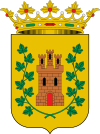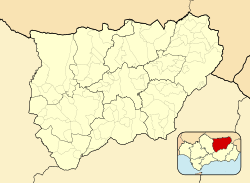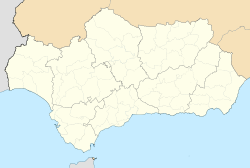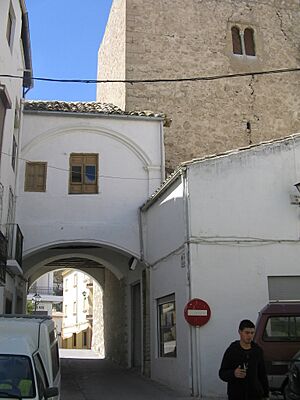Jimena, Spain facts for kids
Quick facts for kids
Jimena
|
|||
|---|---|---|---|
|
municipality
|
|||
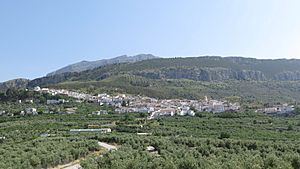 |
|||
|
|||
| Country | |||
| Autonomous community |
|||
| Province | |||
| Municipality | Jimena | ||
| Population
(2018)
|
|||
| • Total | 1,286 | ||
| Time zone | UTC+1 (CET) | ||
| • Summer (DST) | UTC+2 (CEST) | ||
Jimena is a town located in the Province of Jaén, within the region of Andalusia, Spain. In 2018, about 1,286 people lived there.
Contents
Exploring Jimena's Landscape
Jimena is found in the northwest part of the Sierra Mágina mountains. A large section of these mountains, located southeast of the town, is part of the Sierra Mágina Natural Park. This area is known for its beautiful natural scenery.
Local Economy
Most of the land around Jimena is used for growing olive trees. The main activities here are harvesting olives and processing them into olive oil. People also grow fig trees and use the figs for food.
Natural Wonders
One special place near Jimena is the Canavan Pine forest. It has very old and huge pine trees. Because of its unique natural beauty, it has been named a Natural Monument.
Local Celebrations
Jimena celebrates its main festivals from September 7th to 10th. During this time, you can enjoy a lively procession and see many decorated carriages. Lots of people from nearby villages come to join in the fun.
A Glimpse into Jimena's Past
Jimena has a long and interesting history, going back to prehistoric times.
Ancient Settlements
In the Cave of the Rook, you can find ancient rock paintings. These paintings show us about groups of shepherds who lived here between 4,000 and 3,000 BC. Several old settlements from this period have been found in the area. One very important site is Cerro Alcalá, which tells us a lot about Jimena's early history and even its medieval times.
During the Iberian period (around 6th century BC), Cerro Alcalá was an oppidum, which was a large, fortified settlement. It remained important through the Roman era. Some experts believe Cerro Alcalá might be the ancient town of Ossigi, mentioned in old writings.
Many Roman findings, like inscriptions and building parts, show that Jimena likely had a special status as a Municipium during Roman times. This meant it had some self-governance.
Jimena in the Arab Period
During the Arab period, many small farms and rural settlements grew in Jimena. The town had several forts for protection, such as Fountain of the Moor and Cerro Alcalá. One fort, mentioned in old stories as San Istibin or San Astabin, is thought to be near a place called Santisteban today. Records suggest this was one of the castles where the Banu Business family rebelled against the ruler of Córdoba. Jimena (then called Xemena) might have been another one of these fortified castles or a farm after the Christian conquest.
Christian Conquest and Later Years
Jimena was conquered by King Ferdinand III on July 25, 1234. It then became part of the land controlled by the Council of Baeza. In 1284, it became the property of Don Pedro Ruy de Berrio. For about two centuries, it was a small manor. In 1434, King John II gave Jimena to the Order of Calatrava, a military and religious order.
In the 16th century, Jimena supported Baeza in a conflict against King Charles V. It even served as a hidden outpost for the community members. After these events, Emperor Charles V sold Jimena to his secretary, Francisco de los Cobos. From then on, Jimena was owned by Francisco de los Cobos and his family, who later became the Marquis of Camarasa. This continued until noble privileges were ended in 1812.
Jimena's Patron Saint
The patron saint of Jimena is Our Lady of the Remedies. Local stories say that this image of the Virgin Mary appeared in August to a royal scribe named Luis Martinez. A small chapel was built where the image was found, and people have been visiting it to honor the Virgin since 1600. She is considered the patron and a very important part of village life.
The Canavan Sanctuary is a chapel built to honor the Virgen de los Remedios. After Luis Martinez found the image in 1600, a small structure was built at the exact spot. This first structure was more like a "cave" or "niche" and held the image for many years. Later, the people decided to build a larger, proper temple.
Images for kids
See also
 In Spanish: Jimena (Jaén) para niños
In Spanish: Jimena (Jaén) para niños



